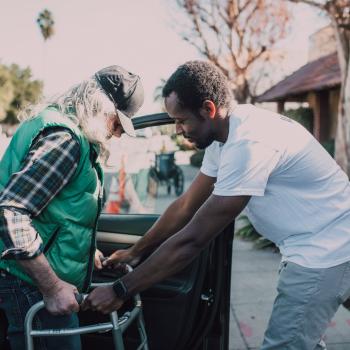 Philip Yancey shared some interesting words about the nature of Christianity and the difference it makes when it is integrated in a person’s life. He speaks of certain benefits that are a by-product of the Christian life. He says, “I am a Christian not because Jesus’ way benefits society but because I believe it is true. If true, it should create the conditions in which human life works best.”
Philip Yancey shared some interesting words about the nature of Christianity and the difference it makes when it is integrated in a person’s life. He speaks of certain benefits that are a by-product of the Christian life. He says, “I am a Christian not because Jesus’ way benefits society but because I believe it is true. If true, it should create the conditions in which human life works best.”
Is Christian morality restrictive or is it more like a handbook that helps your life to flourish?
Modern people don’t seem to buy into Yancey’s view of life and morality, because they see Christian morality as being restrictive, that it seeks to take away your freedom.
However, have you ever thought that Christian morality is more like an owner’s manual that fits your design as a human being? If you align your life with the owner’s manual, your life will flourish. This is what Yancey seems to be saying.
The highly respected criminologist Byron Johnson, in his book, More God, Less Crime: Why Faith Matters and How It Could Matter More, says:
“Religion is a powerful antidote to crime. It clearly impacts the rates of drug use, violence, and gang activity in the inner city. This is why Eugene Rivers, a pastor in Brooklyn, says, “If you want to help underprivileged youth, we have two options: It’s either barbed wire and more black juvenile super predators, or civil society and stronger black churches. It’s that simple.’”
I love the story of the well-known social critic Dennis Prager, who was participating in a debate with the atheist philosopher from Oxford, Jonathan Glover. Apparently, Glover was speaking of all the horrors of religion over the years. Prager then asked a most provocative question:
“If you, Professor Glover, were stranded at the midnight hour in a desolate Los Angeles street and if, as you stepped out of your car with fear and trembling, you were suddenly to hear the weight of pounding footsteps behind you, and you saw ten burly young men who had just stepped out of a dwelling coming toward you, would it or would it not make a difference to you to know that they were coming from a Bible study?”
Glover conceded that it would make a difference.
Think about why your perspective makes a difference.
Think about how your worldview impacts the way you regard a human being. If I believe a person has great value as one who is designed in the image of God, I will treat them with dignity and respect. However, if you see life from a godless perspective and human beings are nothing more than a chance product of nature, why not take advantage of them, mug them and steal their wallet. I think, clearly, Christian virtue and morality make a difference in a person’s life and a community whose citizens subscribe to a Christian worldview. Unfortunately, the Christian view of morality seems to be waning in the Western world.
In a very open interview with The Chicago Sun Times, the famous atheist philosopher Will Durant declared his belief that common people’s lives will fall apart morally if they believe God does not exist. This prediction is what I believe we are seeing come to pass in our land. What is interesting is what Durant says about his own life. He said that he was able to survive morally because he retained the Christian moral code he received during his youth. He acknowledged he had discarded his faith but still retained the morals he had learned growing up. He then made this thoughtful observation:
“You and I are living on a shadow…because we are operating on the Christian ethical code which was given us, infused with the Christian faith…But what will happen to our children? We are not giving them an ethic warmed up with a religious faith. They are living on the shadow of a shadow.”
These words were spoken over forty years ago and his prediction seems to be accurate. It is difficult to live on a shadow, and even more so on a shadow’s shadow. However, this is inevitable if you attempt to live without God.
God has given us moral truth to live by because He knows what we need in order to live a vibrant healthy life.
Another way to see this is to realize that God is like our doctor, who prescribes what we need for our bodies. He does not make up arbitrary suggestions but tells us what to do to stay healthy. The doctor knows and understands the design of the body; if we fail to listen to Him, we risk jeopardizing our health.
We have been given a moral compass to help us address the confusion around us and one that enables us to know the path to go down. This has been found to be objectively true in the research of Guenter Lewy.
An author and political scientist, Lewy has been a faculty member at Columbia University, Smith College, and the University of Massachusetts. Back in the early 1990s, he set out to write a book on why America does not need religion. He saw many of his conservative colleagues taking the position that religion is foundational to morality and social stability, and he intended to prove them wrong. In his own words, he intended “to make a defense of secular humanism and ethical relativism.” He wanted to prove that they were “damned wrong.”
After extensive research, the sheer weight of the evidence caused Lewy to change his mind. Instead, with academic integrity, he ended up writing his book Why America Needs Religion, arguing that religion, particularly Christianity, leads to lower rates of almost every social pathology—including crime, drug abuse, teenage pregnancy, and family breakdown. He clearly recognized the positive influence Christianity makes on people’s attitudes and intentions. He saw unmistakably how it instills responsibility, moral integrity, compassion, and generosity. Lewy concluded:
“Contrary to the expectation of the Enlightenment, freeing individuals from the shackles of traditional religion does not result in their moral uplift. To the contrary, the evidence now shows clearly that no society has yet been successful in teaching morality without religion.”
Lewy makes a strong argument that biblical morality makes a difference when it is followed out in the real world. The only way to explain the outcome of his research is to recognize that when people’s lives are lined up with the objective structure of God’s moral law, they are happier and healthier.
To learn more about the evidence for God that exists, I invite you to read my book Reflections on the Existence of God. The book lays out, in short essays, much of the evidence for the existence of God that is available. We should seek to take the evidence offered and use it to make reasonable conclusions. What you will find is, as the evidence accumulates, it enables us to come to confident conclusions about God. Who He is. And, that He truly is.














